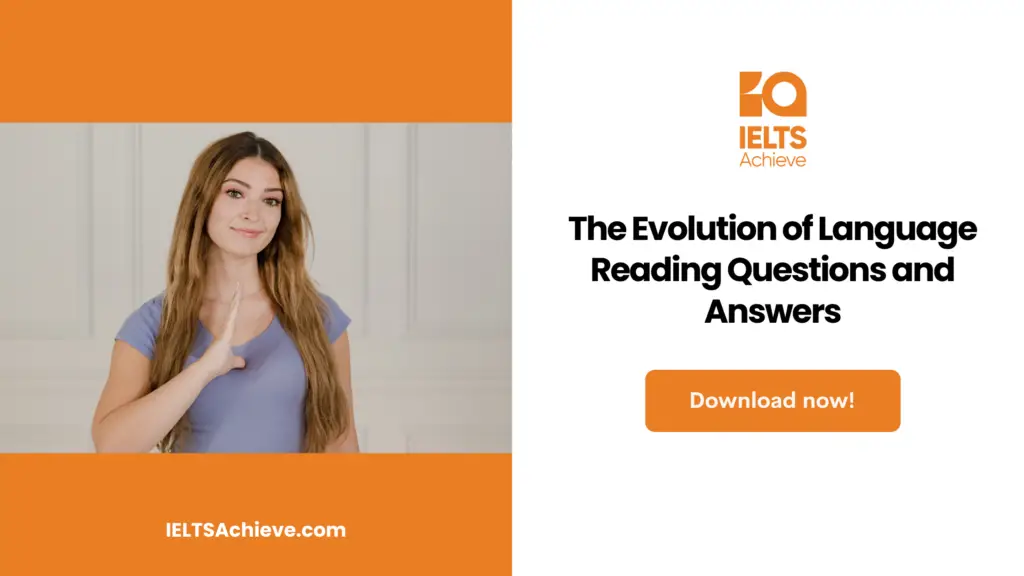The Blog post contains the following IELTS Reading Questions:
- IELTS Reading Matching Headings
- IELTS Reading Yes/No/Not Given
- IELTS Reading Summary Completion
Stay informed and prepared for success – Explore our comprehensive Reading Test Info page to get valuable insights, exam format details, and expert tips for mastering the IELTS Reading section.
IELTS Reading Passage: The Evolution of Language

The Evolution of Language
A. Language everywhere changes over time; it has to. A central reason that necessitates modification is to allow for developments in our world to be expressed. For example, the technological revolution alone has been responsible for the addition of a plethora of words to our vocabulary: hard drive, software, modem to name just a few. The Japanese writing script katakana, which was originally introduced in the 9th century as a means by which Buddhist monks could correctly interpret Chinese pronunciations, is now most commonly used to embrace foreign words for which there is no original Japanese character; pizza or hamburger for example. Likewise, the western world’s exposure to and familiarity with foreign cultures now means that words such as sushi, naan bread, and kebab, for example, are used by diners regularly.
B. However, the expansion of our vocabulary is just one element involved in how and why language evolves. Given the variation of dialects or regional accents present in most language systems, it is clear that an individual’s interpretation of what is correct and commonly used will vary quite dramatically since this perception is based upon a combination of factors including the age, educational level and region of the country a person is from. As we go about our daily lives and interact with others from different backgrounds and experiences, the language we hear is often taken on board and incorporated into how we communicate ourselves. Many phrases with American origins are now commonplace in British English, for example, due to the frequency with which they are heard on television and in the movies.
C. Changes in language are often driven by the young and many such changes are commonly considered by older people to be a disintegration of standards rather than an evolution and an improvement. Let’s consider an Americanism commonly used by youngsters in all parts of the English speaking world. Used as an alternative to “Tom said…” it is now commonplace to hear “Tom goes, the pay rise was unacceptable.” or, “Tom was all, the pay rise was unacceptable.”; much to the horror of many traditionalists. However, this modification could also be considered to be adding to and not detracting from our ability to communicate effectively. To illustrate, let’s consider the original phrase “Tom said”; it is used solely to show the listener that we are reporting the words of Tom, while the modern variation, “Tom goes” has the same meaning. However, if the speaker chooses instead to use the latter phrase, “Tom was all”, they are also able to convey the message that Tom had an emotional reaction to the situation they are reporting, therefore a much more effective method of communicating information has been created, some may say. However, should the now commonly used texting abbreviations such as ‘gr8t’ (great) and ‘l8r’ (later) become permanent replacements of the original words, it is likely that even the most liberal amongst us would be horrified.
D. Variations on the language are usually more readily accepted into informal language before being absorbed for use in formal writing. Examples of words that we now commonly use, but were once considered incorrect, are ‘pea’ and ‘hopefully’. Let’s take pea; it derived from the word ‘pease’, which is an uncountable noun that has the same form regardless of whether one or more pease were being spoken about. However, this was commonly overlooked and misunderstood, and through error, the singular form of the vegetable became ‘pea’. More recently ‘hopefully’ was considered by many to be an inappropriate alternative to ‘I hope’; at best only accepted in informal use. The word hopefully is now’ fully acceptable in both informal speech and formal writing.
E. Some people believe that traditional usages of language are always more superior and refined than modern variations even when the reasons behind the rule were dubious in the first place. For example, it was once seriously frowned upon to split an infinitive in a sentence and even today it is considered grammatically incorrect to do so. To demonstrate, let’s consider the following sentence: ‘The examiner asked me to quietly leave the room’; this was considered incorrect as the word ‘quietly’ splits the infinitive of the verb ‘to leave’. The origins of this rule hail back to the 17th century when scholars believed that the English language should be adapted to follow the rules of Latin; then considered the perfect language. Since splitting infinitives in Latin is impossible, it was decided that splitting infinitives in English, even though possible, was not acceptable. Given those initial motivations behind the rule were questionable and the clarity of the meaning of the sentence is not compromised in the ‘incorrect’ form, it could be argued that this grammar rule is a prime example of an unnecessary sanction which is likely to be abandoned in the future.
F. As language evolves, changes in grammar structures that would confuse the actual meaning of the sentences are unlikely; however, the meanings of words are often modified or altered beyond recognition by different generations and can be easily misinterpreted by other social groups. Take, for example, the modern version of the word ‘bad’ meaning ‘great’ when used in contemporary slang. Many slang words remain dated in the era in which they are developed, for example, words like ‘to beef, meaning to complain (introduced in the 1920s) are not only dated but may not even be understood in a modern context, while others such as ‘guy’ become absorbed into mainstream language. Who knows what future generations will add to the ever-changing environment of communication?
Unlock your full potential in the IELTS Reading section – Visit our IELTS Reading Practice Question Answer page now!
Recommended Questions:
Renewable Energy IELTS Reading Question with Answer
Questions
Questions 1-4
- Reading Passage has six paragraphs A-F
- Choose the correct heading for paragraphs B,C,E and F from the list of headings below
- Write the correct number i-viii in boxes 1-4 on your answer sheet
List of Headings
- Historical acceptance of change
- The Generation Gap
- Influences on speech
- Ancient writing in Asia
- Cultural evolution and its impact on language
- Slang expected in the future
- Questioning logic
- The lifespan of vocabulary
Example: Paragraph A; Answer: v
1.Paragraph B
2.Paragraph C
Example: Paragraph D; Answer: i
3.Paragraph E
4.Paragraph F
Ready to conquer Matching Headings questions? Click here to learn essential tips and techniques for matching headings accurately to paragraphs or sections in the IELTS Reading section.
Questions 5-10
- Do the following statements reflect the claims of the writer in Reading Passage?
- YES if the statement reflects the claims of the writer
- NO if the statement contradicts the claims of the writer
- NOT GIVEN if it is impossible to say what the writer thinks about this
Write the correct answer YES,NO or NOT GIVEN in boxes 5-10 on your answer sheet.
5. If language were static, it would negatively affect our ability to incorporate other cultures into our own way of life.
6 The language we grow up knowing and that we adopt through new experiences have equal effects on the way we speak.
7 English used in Britain has changed more than American English over recent years.
8 Some older variations of language are more expressive than more modern forms.
9 All modern adaptations of language are suitable for mainstream use.
10 All word usage has changed over time due to misunderstandings of meaning.
Want to excel in identifying the writer’s views and claims? Click here to explore our in-depth guide on how to accurately determine Yes, No, or Not Given in the IELTS Reading section.
Questions 11-13
- Complete the summary of paragraphs E and F with the list of words A-H below.
- Write the correct letter A-H in boxes 11-13 on your answer sheet.
Some grammar rules such as avoiding 11 ____________ are deeply entrenched in history and were created by academics who wished to perfect the English language. It is likely, however, since they do not impact on the 12 ______________ of the sentence that such rules are likely to be 13 ______________ in the future. In the same way, many contemporary words in common usage today are likely to become defunct.
A Slang
B Split infinitives
C Grammatically incorrect
D Meaning
E Recognition
F Disregarded
G Misinterpreted
H Confusion
Boost your performance in Summary, Notes, Table, and Flowchart Completion tasks. Click here to explore our detailed guide and learn how to effectively complete summaries, notes, tables, and flowcharts in the IELTS Reading section.
Unlock your full potential in the IELTS Reading section – Visit our IELTS Reading Practice Question Answer page now!
Recommended Questions:
Renewable Energy IELTS Reading Question with Answer
Answers for the evolution of language
1. Answer: iii
2. Answer: ii
3. Answer: vii
4. Answer: viii
5. Answer: Yes
6. Answer: Not given
7. Answer: Not given
8. Answer: Not given
9. Answer: No
10. Answer: No
11. Answer: B
12. Answer: D
13.Answer: F

We hope you found this post useful in helping you to study for the IELTS Test. If you have any questions please let us know in the comments below or on the Facebook page.
The best way to keep up to date with posts like this is to like us on Facebook, then follow us on Instagram and Pinterest. If you need help preparing for the IELTS Test, join the IELTS Achieve Academy and see how we can assist you to achieve your desired band score. We offer an essay correction service, mock exams and online courses.

